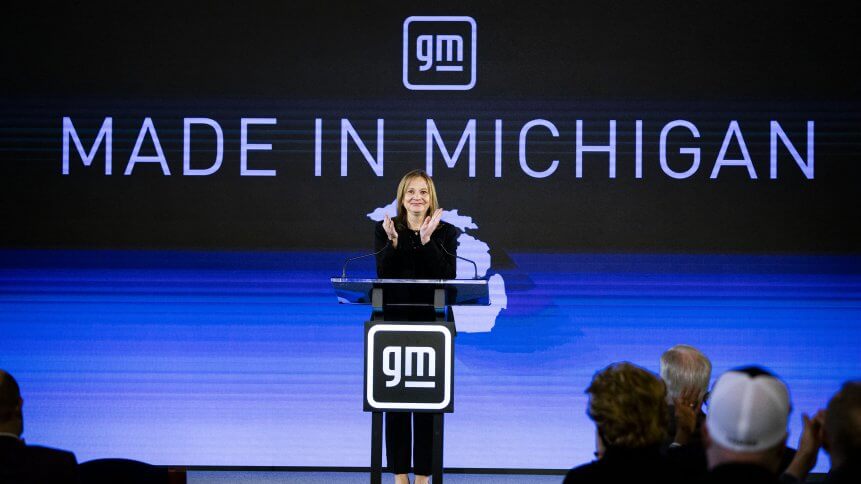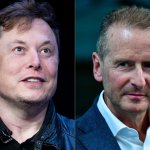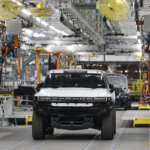General Motors ups sustainability game as auto giants jockey for green dominance

- General Motors is ramping efforts to dethrone Tesla in the US
- The investment is part of a bigger goal, to increase its North American production capacity to build 1 million electric vehicles by 2025
- More players are realizing the age of the battery-powered vehicle is here and are gaming out how to stay on top and challenge Tesla
Mid last year, General Motors announced a goal to achieve global electric vehicle (EV) sales of more than one million by 2025. In the same period, the auto giant will also be increasing its EV and autonomous vehicle (AV) investments to US$35 billion. To top it off, GM’s CEO and chair Mary Barra believes that the company can “absolutely” catch Tesla’s EV sales in the US within the next three years.
In that spirit, GM this week announced that it plans on spending approximately US$6.6 billion in its home state of Michigan through 2024 to increase electric pickup-truck production and build a new EV battery cell plant. The investment, as expected, is a part of the US$35 billion the company has pledged to spend and its effort to dethrone Tesla in the US.
In a statement, Barra said: “We will have the products, the battery cell capacity and the vehicle-assembly capacity to be the EV leader by mid-decade.” The investments include US$2.6 billion for a new battery plant through a joint venture with LG Energy Solution in Lansing, Michigan.
As it is, LG Energy Solution, who commands more than 20% of the global EV battery market, is already building two plants with General Motors in Ohio and Tennessee to manufacture 70 GWh of batteries, which could power about one million EVs by 2024. The latest collaboration is expected to be funded equally via Ultium Cells, their US-based battery joint venture, under what will be their third joint battery plant in the US, LG Chem’s regulatory filings showed.
Another US$4 billion of the overall US$6.6 billion is to convert its Orion Assembly plant in suburban Detroit to produce electric trucks such as upcoming versions of the Chevrolet Silverado and GMC Sierra, beginning in 2024. GM even announced an additional US$510 million in investments in two Lansing-area vehicle-assembly plants to upgrade for non-electric vehicles.
“Today we are taking the next step in our continuous work to establish GM’s EV leadership by making investments in our vertically integrated battery production in the US and our North American EV production capacity. We are building on the positive consumer response and reservations for our recent EV launches and debuts, including GMC HUMMER EV, Cadillac LYRIQ, Chevrolet Equinox EV and Chevrolet Silverado EV,” she said.
YOU MIGHT LIKE

Can Volkswagen beat Tesla to conquer the EV market?
In short, GM’s plan is to create “the broadest EV portfolio of any automaker and further solidifies our path toward the US EV leadership by mid-decade,” as Barra puts it. It is fair to note that over the last two years, GM has been the leader in US full-size truck deliveries.
Besides General Motors, who are other players challenging Tesla’s crown?
Overall, more and more companies are jumping on the green vehicles bandwagon as auto giants around the world pledge to be cleaner. For an instance, Ford Motor Co has plans to be the Tesla of connected commercial vehicles.
The auto giant even has plans on increasing the production target for the automaker’s electric F-150 to 150,000 a year, more than three times the original number. Ford also wants to start to scale and commit serious resources to digital software and services-based revenue.
Its CEO Jim Farley wants investors and commercial vehicle customers to pay more attention to the software and services Ford wants to sell with those trucks, as well as to the company’s electric Transit vans and its portfolio of combustion engine commercial vehicles.
Then there are other carmakers like Volkswagen AG and Toyota Motor Corp, the world’s two biggest auto players — each sold roughly 10 or 11 cars for everyone that Elon Musk produced last year. Having realized the age of the battery-powered vehicle is here, both automakers have been gaming out how to stay on top.









